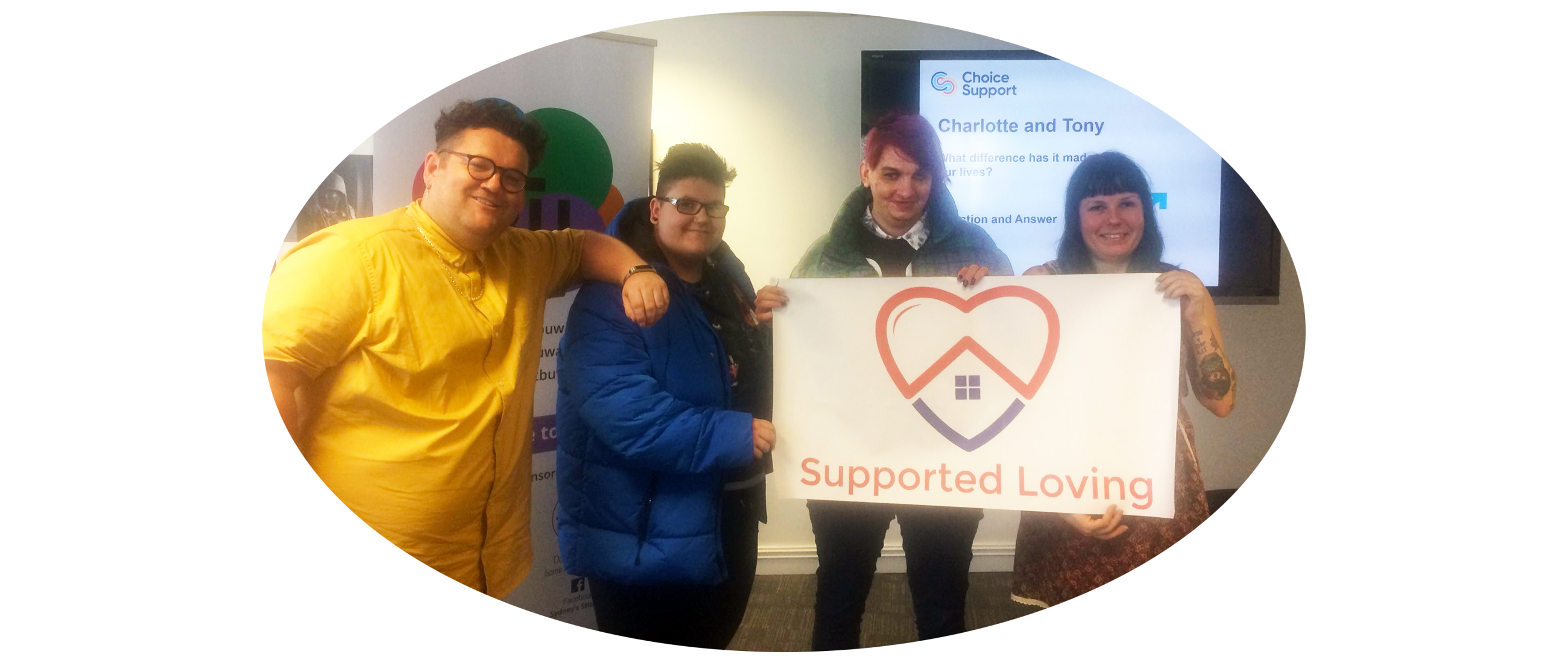Blog
Supported Loving meets the British Psychological Society

Supported Loving and 2BU, a LBGTQ+ social group for adults with learning disabilities, present powerful first-hand accounts to the British Psychological Society.
I was very excited when Supported Loving was asked recently to speak at the British Psychological Society (BPS). I never imagined when I was doing my undergraduate psychology degree that I would one day be asked to be a speaker there myself. I spoke to clinical psychologists from the South Thames Regional Group of the Division of Clinical Psychology Faculty for People with Intellectual Disabilities.
Also joining me was Christian Buchan, the founder of 2BU, and two members, Charlotte and Tony. 2BU Wakefield is a LBGTQ+ social group for adults with learning disabilities.
It was a positive afternoon with an engaged group of around thirty enthusiastic learning disability clinical psychologists. We started the day by asking what everyone saw as the main challenges facing people with learning disabilities regarding relationships. Their feedback was very similar to what’s been found recently on the Tizard’s Love Project, where I am part of the research team exploring support for people with learning disabilities to find loving relationships. (Other researchers on the Tizard Love Project team are Michelle McCarthy (PI), Rachel Forrester-Jones, Claire Bates, Karen Milne-Skillman and Nicola Elson.)
Challenges included:
- a lack of places to meet people/social opportunities
- restrictive attitudes from staff or parents
- relationships not being taken seriously
- a lack of relationships or sex education
- and a lack of understanding/ awareness that this is what people want.
What surprised me was that mental capacity regarding relationships was barely mentioned. A topic so frequently discussed by social care staff in Supported Loving network meetings and in the Love Project research. Social care staff believe this is a real barrier and often seek psychology input for assessments around sex and relationships.
However, the clinical psychologists we spoke to did not feel the same concerns surrounding capacity. They felt an assessment would only be necessary if there were concerns over capacity or in a potential forced marriage situation. Not a routine assessment if a couple began dating or wanted to have sex.
This suggests that perhaps some social care staff are being over cautious and placing barriers where they are not needed. This is understandable as a climate of fear surrounding capacity and sex has developed. Staff may fear being blamed for supporting a relationship that has any negative consequences. Having an assessment “signed off” by a professional presumably affords some reassurance.
I shared some more findings during the session from our research findings on the Tizard Love Project. We also discussed the work of 2BU, including how and why it was set up and the difference it has made to members like Tony and Charlotte. You can read more about the accessible Transgender Guide that we spoke about, which has been developed in partnership, by clicking the link below.
The most powerful part of the session was hearing Charlotte share her story of transitioning from male to female with support from Choice Support staff and her clinical psychologist. Everyone agreed that Charlotte was very brave for sharing such a personal part of her life with a room of thirty strangers. Psychology support was incredibly helpful for Charlotte in starting her long journey to transition.
It is so important that more psychologists get to hear the challenges faced by people with learning disabilities in this area. There is nothing more powerful than hearing this directly from people themselves. It was also amazing for me to see how far Charlotte had come from the shy person I first knew who barely spoke, to being able to confidently share her story.
We closed the session by asking psychologists what they could change about their practice to help people with learning disabilities to have relationships. There was a feeling that sexuality and relationships had “fallen off the radar” after the focus it received during the 1990’s - 2000’s with the publication of Valuing People Now. They felt that it was important to start conversations with people about whether they were in a relationship (and what this meant to them) as opposed to just collecting information on marital status as this could be missing people who were in a relationship but not married.
Psychologists felt this would get more people thinking that this was considered important. There was an interest in asking organisations what policies were in place to support people regarding sexuality and relationships. Some psychologists felt that we should be exploring why people do not have a relationship if this is something they want and challenge the assumption that a relationship is something that is “nice to have but not essential”.
We left the day feeling very positive and encouraged by the conversations we had - this is what we try to do at Supported Loving, it’s all about the conversations. Getting different professionals together with people with learning disabilities to start unpicking our own assumptions and ideas and to be challenged and inspired.
Thank you to Dr. Sandra Baum (Consultant Clinical Psychologist from Oxleas NHS Foundation Trust) for inviting us and to Christian, Tony and Charlotte for being such stars.
Read more about:
- The Transgender Guide we spoke about and worked on with Change and CMG here.
- 2BU
- Supported Loving
- Tizard’s Love Project
Dr Claire Bates, Choice Support, Quality Analyst/ Researcher
The views expressed in the Supported Loving blog are not necessarily those of Choice Support.


